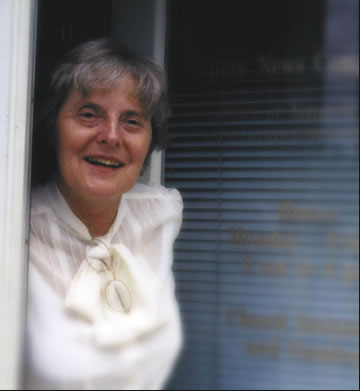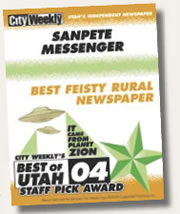
Vol. 15 No. 3 |
Winter 2005-06 |

A MESSENGER IN MANTI
Alumna Suzanne Dean finds fulfillment
as the “feisty” editor/ owner/ publisher of a rural newspaper.
Manti City (pop. 3,000-plus) is the seat of Sanpete County (pop. 25,000), which lies about 150 miles south of Salt Lake City, in Utah’s heartland.
Driving south on I-15—through the chaos, cars, and inevitable road construction of the Orem-Provo-Spanish Fork area—the road to Manti turns east toward old Highway 89, recently dubbed “The Heritage Highway,” which used to be a main north-south thoroughfare until I-15 to the west assumed prominence.
After the noise and fumes of the Wasatch Front, a sacred silence descends during the drive through small towns with names that reflect Mormon pioneer roots—Nephi, Moroni, Ephraim. The road winds past yellow fields dotted with bales of hay, a turkey farm, a small herd of black-and-white-spotted milk cows resting under a grove of trees, and 19th-century pioneer homes shaded by tall Lombardy poplars and broad-limbed cottonwoods. Some of the houses have been restored as B & Bs and are neatly groomed; others have fallen into disrepair. Newer homes lie on the outskirts of the towns, indicative of the growth spurt the region is undergoing. Outside Ephraim, moder nity further intrudes in the form of a Wal-Mart Superstore, thereby destroying the Brigadoon-like illusion of being in another time and place.
 |
The
groundbreaking of the Manti temple, the third operating temple of
the Church of Jesus Christ of Latter-day Saints, was dedicated by
Brigham Young in 1877. |
On the approach to Manti, a citadel is visible atop a hill. It could be mistaken for a medieval castle, but up close the building reveals itself as the historic LDS temple, dedicated by Brigham Young in 1877, for which the town is renowned.
The modest building that houses the Sanpete Messenger sits on the main street of downtown Manti. It’s Tuesday, and Suzanne Dean BS’71, the paper’s owner, editor, and publisher, is having a computer problem, which contributes to the hubbub generated by hurrying to meet a deadline. She periodically pops up from her desk to check on layout or discuss a story detail with her staff.
But wait; stop the presses! How did Dean, a graduate of Columbia University’s prestigious Graduate School of Journalism in New York, end up in a small, rural community in Utah? Her profile, which would fit well in the news paper she’s now heading, tells it all.
 At
age 12, growing up in the small Mormon town of Joseph City, Ariz., Dean
knew she wanted to be a journalist, and she never wavered from that goal.
Now, some 40-plus years later, she is working toward another objective:
to make the Sanpete Messenger “the best little newspaper
in America.”
At
age 12, growing up in the small Mormon town of Joseph City, Ariz., Dean
knew she wanted to be a journalist, and she never wavered from that goal.
Now, some 40-plus years later, she is working toward another objective:
to make the Sanpete Messenger “the best little newspaper
in America.”
For Dean, the journey from Joseph City to Manti has been filled with more than a few bumps, twists, and turns, but she has always managed to keep her eye fixed on the road ahead. The expedition began when she attended the University of Utah, where she worked on the staff of The Daily Utah Chronicle as summer editor. After graduation from the U, thoroughly infected with the journalism bug, she pursued a master’s degree at Columbia and cut her trade teeth with an internship at The Washington Post. Returning West, she bounced around a bit, writing for the Deseret News and teaching jour nalism at the University of Idaho and the University of Wyoming. She eventually joined the U of U’s PR department and stayed for eight years. She then worked at other nonjournalism-related jobs while waiting for the classic “right moment” to get back to what she loved.
That moment arrived when she heard rumors that the Messenger-Enterprise (a weekly combined from the former Manti Messenger and Ephraim Enterprise) was up for sale. She jumped at the opportunity to head up her own newspa per—something she had always wanted to do. “I would have gone anywhere in the Intermountain West,” she says. Negotiations ensued, and in November 2000 she found herself the owner of a small, rural newspaper. (Dean’s first acquisition was the Messenger-Enterprise, but she eventually bought up two other local publications, the Salina Sun and the Gunnison Valley News, to create the Sanpete Messenger.)
In the beginning, the paper wasn’t able to pay Dean a salary, so for more than two years she commuted twice weekly to a PR job in Sandy, a suburb of Salt Lake City, to make ends meet. Eventually she was able to move to Ephraim—10 miles north of Manti, for a vastly reduced commute—and to devote her full attention to the Messenger. Dean maintains that the move from an urban to a rural environment didn’t present the anticipated culture shock. On the contrary, having spent part of her childhood visiting her grandparents in Joseph City—surrounded by an extended family of aunts, uncles, and cousins, and listening to the local lore—she was used to rural life and even “yearned to recapture that feeling.”
In Manti, she has immersed herself in her job, and in the local scene.
|
Sanpete
Messenger Goal: to be “the best little newspaper in America." |
Published weekly, the paper must be finished Tuesday evening so it can be uploaded onto an FTP (file transfer protocol) site in Richfield, 90 miles away, and then printed. The newspaper, with a print run of 3,800, is distributed to about 2,700 subscribers throughout Sanpete County via eight township post offices.
In 2000, there were only three employees crammed into a small space. Now there are 17 people working part or full time, plus about 30 other community correspondents. The on-site workspace has expanded into an adjacent storeroom area.
Dean describes the Messenger as a “classic community newspaper.” The news is strictly local, focusing on the happenings and events that take place weekly in the county. There is no dearth of stories to cover. From town council to school board meetings, and from county fairs to local elections, the Sanpete Messenger includes a wide variety of stories each week. At the same time, the paper succeeds in stirring things up a bit.
Dean doesn’t shy away from taking a stand on controversial topics. Her editorials have addressed questions ranging from a school district’s high administrative salaries to raising county taxes, and from political conflicts of interest to questionable land deals and environmental issues. In the process, she may have raised a few temperatures, but she has also cultivated a number of friends and allies. In fact, she takes a genuine interest in community affairs, getting to know the locals, befriending city officials, and earning the respect of readers for her “great service to the county,” as one grateful citizen commented. A staunch supporter of community commonality, Dean has appointed an ombudswoman to deal with questions and complaints from readers.
 In
2004, Salt Lake’s alternative City Weekly newspaper named
the Sanpete Messenger the “Best Feisty Rural newspaper”
of the year, noting that “[If] Dean’s gotten some heat for
her aggressive style … smart locals know they’re lucky to
have her, and the Sanpete Messenger.”
In
2004, Salt Lake’s alternative City Weekly newspaper named
the Sanpete Messenger the “Best Feisty Rural newspaper”
of the year, noting that “[If] Dean’s gotten some heat for
her aggressive style … smart locals know they’re lucky to
have her, and the Sanpete Messenger.”
Dean points out that rural life isn’t as bucolic as one might think: “The county has its share of accidents, suicides, a few shootings, house break-ins, and a pretty serious drug problem,” about which the paper did a multi-part series. While Sanpete County is perhaps 90-plus percent Mormon, the rural environment has also attracted those with “alternative” lifestyles, including a few hippies and polygamists, which can make for a potent mix and highlights the religious divide that exists in the region.
And there are inevitably a few tragedies. While they may make for wrenching reading, they also take a toll on those doing the reporting. One story that Dean says “got to me” was the case of a man driving on a canyon road with his grandchildren in tow. Somehow the car rolled off the mountain, killing one child and critically injuring another, and paralyzing the grandfather. He later tested positive for marijuana and was prosecuted for automobile homicide. Observes Dean: “Seeing him come to court in a wheelchair, and hearing that he was now completely indigent and living in a nursing home, and knowing the remorse he must have felt over his grandchild’s death, well, that was just a terrible, terrible case.”
There have been others, but Dean has learned to roll with the punches, like any other journalist committed to and absorbed by her profession. It’s exhausting work. Dean sometimes puts in 80 to 90 hours a week. “There are times when I think, ‘I can’t do this anymore,’ ” she says. On the other hand, she acknowledges that it’s a huge advantage being your own boss and creating your own product. “I can have any bottom line I want.”
Dean has a vision as to what the paper might look like someday. She is committed to performing a service for the community and believes that the newspaper plays an important role in fostering a sense of commonality. She also wants her staff to have a thoroughly positive experience and finds pleasure in nurturing them along.
In the meantime, her level of satisfaction with all that she has taken on is sky high, occasionally stratospheric. “It’s a blast,” she says, simply, and returns to her work.
—Linda Marion BFA’67 MFA’71 is managing editor of Continuum.